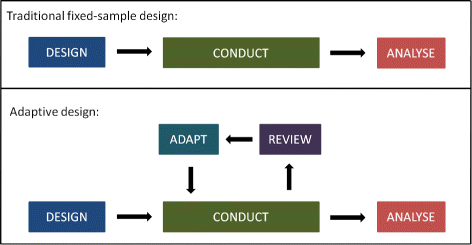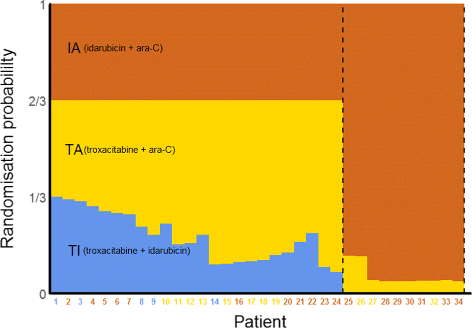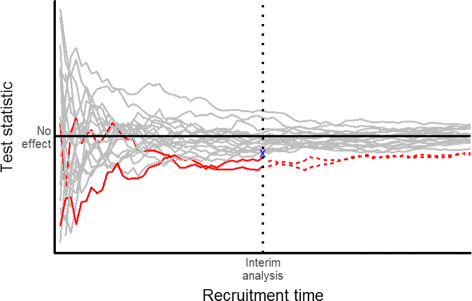Adaptive designs in clinical trials: why use them, and how to run and report them
- PMID: 29490655
- PMCID: PMC5830330
- DOI: 10.1186/s12916-018-1017-7
Adaptive designs in clinical trials: why use them, and how to run and report them
Abstract
Adaptive designs can make clinical trials more flexible by utilising results accumulating in the trial to modify the trial's course in accordance with pre-specified rules. Trials with an adaptive design are often more efficient, informative and ethical than trials with a traditional fixed design since they often make better use of resources such as time and money, and might require fewer participants. Adaptive designs can be applied across all phases of clinical research, from early-phase dose escalation to confirmatory trials. The pace of the uptake of adaptive designs in clinical research, however, has remained well behind that of the statistical literature introducing new methods and highlighting their potential advantages. We speculate that one factor contributing to this is that the full range of adaptations available to trial designs, as well as their goals, advantages and limitations, remains unfamiliar to many parts of the clinical community. Additionally, the term adaptive design has been misleadingly used as an all-encompassing label to refer to certain methods that could be deemed controversial or that have been inadequately implemented.We believe that even if the planning and analysis of a trial is undertaken by an expert statistician, it is essential that the investigators understand the implications of using an adaptive design, for example, what the practical challenges are, what can (and cannot) be inferred from the results of such a trial, and how to report and communicate the results. This tutorial paper provides guidance on key aspects of adaptive designs that are relevant to clinical triallists. We explain the basic rationale behind adaptive designs, clarify ambiguous terminology and summarise the utility and pitfalls of adaptive designs. We discuss practical aspects around funding, ethical approval, treatment supply and communication with stakeholders and trial participants. Our focus, however, is on the interpretation and reporting of results from adaptive design trials, which we consider vital for anyone involved in medical research. We emphasise the general principles of transparency and reproducibility and suggest how best to put them into practice.
Keywords: Adaptive design; Design modification; Flexible design; Interim analysis; Seamless design; Statistical methods.
Conflict of interest statement
Ethics approval and consent to participate
Not applicable.
Consent for publication
Not applicable.
Competing interests
AWB is an employee of Roche Products Ltd. LVH is an employee of AstraZeneca. All other authors declare that they have no competing interests.
Publisher’s Note
Springer Nature remains neutral with regard to jurisdictional claims in published maps and institutional affiliations.
Figures



References
-
- Friedman FL, Furberg CD, DeMets DL. Fundamentals of clinical trials. New York: Springer; 2010.
-
- Shih WJ. Plan to be flexible: a commentary on adaptive designs. Biometrical J. 2006;48:656–9. - PubMed
-
- Berry Consultants. What is adaptive design? 2016. http://www.berryconsultants.com/adaptive-designs. Accessed 7 Jul 2017.
-
- Campbell G. Similarities and differences of Bayesian designs and adaptive designs for medical devices: a regulatory view. Stat Biopharm Res. 2013;5:356–68.
-
- Chow SC, Chang M. Adaptive design methods in clinical trials. Boca Raton: Chapman & Hall/CRC; 2012.
Publication types
MeSH terms
Grants and funding
- MC_UU_00002/6/MRC_/Medical Research Council/United Kingdom
- MR/K025635/1/MRC_/Medical Research Council/United Kingdom
- MC_UU_12023/29/MRC_/Medical Research Council/United Kingdom
- G0800860/MRC_/Medical Research Council/United Kingdom
- MR/N028171/1/MRC_/Medical Research Council/United Kingdom
- DRF-2012-05-182/DH_/Department of Health/United Kingdom
- MC_UP_1302/4/MRC_/Medical Research Council/United Kingdom
- 15958/CRUK_/Cancer Research UK/United Kingdom
- MC_UU_00002/3/MRC_/Medical Research Council/United Kingdom
- SRF-2015-08-001/DH_/Department of Health/United Kingdom
- DRF-2015-08-013/DH_/Department of Health/United Kingdom
- C22436/A15958/CRUK_/Cancer Research UK/United Kingdom
- MR/L004933/1/MRC_/Medical Research Council/United Kingdom
- MC_UU_12023/24/MRC_/Medical Research Council/United Kingdom
- MC_EX_UU_G0800814/MRC_/Medical Research Council/United Kingdom
- MR/L004933/2/MRC_/Medical Research Council/United Kingdom
- MC_UU_12023/25/MRC_/Medical Research Council/United Kingdom
- MR/L004933/1-R/N/P/B1/MRC_/Medical Research Council/United Kingdom
LinkOut - more resources
Full Text Sources
Other Literature Sources
Medical

